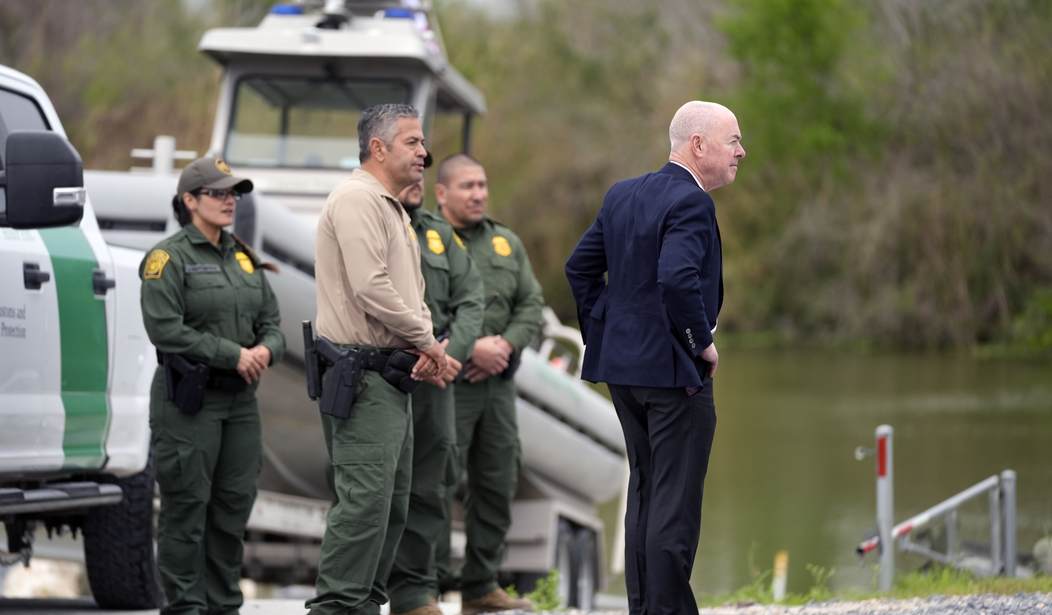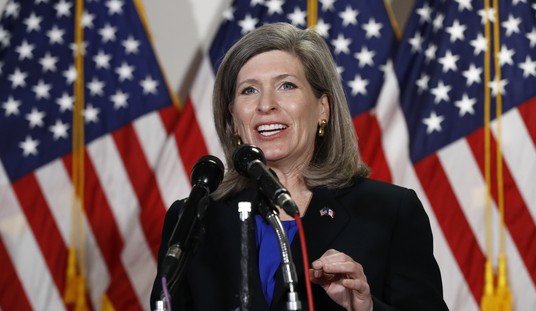Homeland Security Secretary Alejandro Mayorkas visited Ezra Klein's podcast this week and the results are pretty interesting. What's immediately apparent in this discussion is that progressive commentator Ezra Klein understands the conservative critique of the Biden administration's actions. He's not ignorant of what happened at the border (and why) during the Biden administration.
And yet, you also get the feeling he's slow-walking things intentionally. This is not a confrontational interview. Instead, Klein seems content to introduce each point and then give Mayorkas an extended chance to deny the obvious. The overall impression is sort of surreal. All of the dots are there but Klein doesn't seem interested in connecting them.
I think the way to do this is just to highlight some of the questions Klein asked and you'll see what I mean.
Ezra Klein: We had a significant surge in migrants at the southwestern border during the first three years of the Biden administration. We saw that peak at about 300,000 encounters last December, the most ever recorded. What made so many more people decide to take the dangerous journey to the United States between 2021 and 2023?
Mayorkas offers a bunch of explanations including the pandemic, poverty, etc. and Klein points out that those explanations don't really make sense.
I take your point on the pandemic, though border crossings really rise most sharply in 2023 — not 2022 or even 2021. But if you look over the past 50, 75 years, there are many points of really significant and far worse poverty, certainly — of civil war, of murderous military juntas — that did not lead in those periods to this level of migration to America. So if it is the instability that is the cause, why is it so much worse now?
Again, Mayorkas offers a long response about external factors and Klein gently directs him to a factor he hasn't mentioned: Communication.
I want to zoom in on that question of communication for a minute. What I didn’t understand about the rise of these transnational smuggling networks was the degree to which they act as marketers. It’s not just that you go to them in desperation and pay them. They’re actually telling you when to go. They’re trying to drum up business — “You have to go now before the U.S. does this policy change or before it stops having this new policy.”
The interview then turns to other issues, i.e. the broken asylum system, etc. for quite a while, as if Klein is giving Mayorkas a long lead up to what comes next. But eventually he does return to the issue of communication.
I do want to get your response to the thing I hear often from people who are, I would say, more sensibly on the right of this issue. What they say when they look at the data of migrant flows is that when Trump was in office, he made very clear that America was unfriendly to migration in general and illegal migration, in particular. So fewer people came, for the most part. And when things spiked, he acted very quickly to lean on our partners and twist their arms to bring that spike back down.
And then Democrats won in 2020. Trump’s actions had pushed the party to be a much more pro-immigrant party than it had been...The belief was that the Biden administration was a much more compassionate administration, was rolling back some of what Trump did, and the migration number soared, and that itself was a kind of policy failure.
And here, Mayorkas just offers a flat denial. "I don’t believe that rhetoric was the draw to people," he said. He goes back to COVID and the broken immigration system. He refuses to let any blame fall on Joe Biden.
This is simply not a tenable position. What I've been calling the conservative case is really just the factual case. All of this was reported years ago by the Washington Post, which noted that Biden's own rhetoric on the border played a clear role in boosting the number of migrants. Indeed, Biden himself was well aware his rhetoric had the potential to do this and even worried that he might suddenly have 2 million people show up at the border if he wasn't careful. But the urge to publicly undo Trump's policies was too strong to resist. Biden made a big show of it and within about a year, he did have 2 million people coming to the border.
He issued five immigration executive orders on Inauguration Day alone and promised an immigration policy far more humane and welcoming than that of his predecessor. His administration also began allowing unaccompanied minors into the country, a marked departure from the Trump administration’s approach.
Now, the Biden administration is scrambling to control the biggest surge in 20 years, with the nation on pace for as many as 2 million migrants at the southern border this year — the outcome Biden said he wanted to avoid...
The situation at the border — which Biden and his advisers steadfastly refuse to call a crisis — is the result of an administration that was forewarned of the coming surge, yet still ill-prepared and lacking the capacity to deal with it. Administration officials have been plagued by muddled messaging, sometimes making appeals that seem directed more at liberal activists than the migrants they need to dissuade from coming to the country.
Mayorkas is just outright denying this reality. Klein clearly knows what really happened here but seems unwilling to push the point that the timing and the numbers demonstrate that the Biden administration's botched communications on the border played a big role in this.
Klein also undercuts another part of the claim Mayorkas has been making all along. If the flood of immigrants that began in 2021 and lasted until just recently is the result of external push factors rather than pull factors (like Biden's communication and actual border policy) then how is it that the Biden administration was able to turn down the numbers so dramatically this summer? Again, Klein's question clearly indicates he knows this doesn't make sense. [emphasis added]
I was hearing a lot about hemispheric conditions — the economic instability, the gang rule, government collapse in places like Venezuela. And I understood the message of that to be, “This isn’t really up to us. How many people are coming to the border is not up to us. It reflects conditions in other places, and we can deal with it more or less humanely.” Then there was a bipartisan bill, which failed, and then the June executive actions. And the flow stopped — or at least seems to have halved or more than halved pretty rapidly. Which is interesting because it implies that we actually do have, through policy mechanisms, a fair amount of control. That if we change what we’re doing at the border, people’s risk calculation to migrate or not changes and that that is pretty sensitive to policy.
Simply put, the push factors Mayorkas keeps focusing on aren't the whole story. What you actually do at the border and in communication about the border matters a lot. Mayorkas offered another filibuster answer and, to his credit, Klein interrupted him and wouldn't let him cloud the issue.
I wanted to interrupt on this because I feel you’re trying to complicate this away from the June actions. And I’m not saying these other actions were not important, but a lot of things you’re talking about happened much earlier. And the drop, which is sharp and disjunctive inside the data, follows the more enforcement-oriented executive actions of June.
Enforcement works. Proper messaging about enforcement works. The Trump administration proved that was the case and so, in a way, did the Biden administration. When Biden publicly denounced and abandoned enforcement, the numbers shot up. When Biden finally got serious about enforcement (both in Mexico and at the border) the numbers suddenly dropped by half.
The point is, the Biden administration had the levers to control this all along. All of the chaos the country has seen over the past three years, not just at the border but in cities like New York and Chicago and many others, falls on Mayorkas and Biden. This was their mess and the fact that they've just recently cleaned it up prior to the election only proves they could have done this far sooner if they'd been inclined to do so.
As for Ezra Klein, give him credit for clearly understanding all of this even if he's mostly leaving it to readers to draw their own conclusions about who dropped the ball. You're not going to hear him say it this bluntly in the pages of the NY Times, but the inescapable conclusion is that the Trump administration understood how to manage this problem better than the Biden administration did, at least until very recently.







Join the conversation as a VIP Member